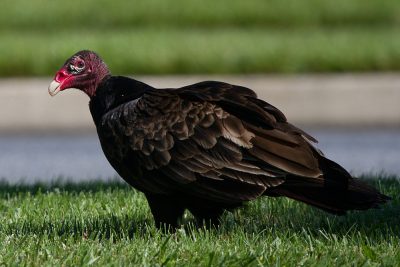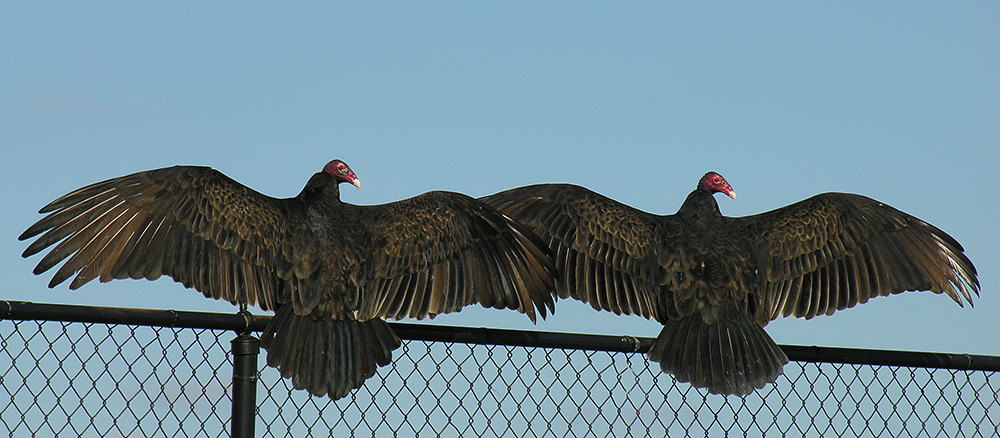By Eric Halvarson

Turkey vultures are the most abundant species of vulture in the Americas and range from Canada to Chile. They play a crucial role in nature by using their powerful sense of smell to locate the carcasses they feed on. Photo by Frode Jacobsen
The two types of North American vultures are often conflated with one another even though they can be distinguished from afar.
“Black vultures have a dark, wrinkly head and a noticeably short tail” says bird watcher Doug Rogers of Monticello Bird Club in Virginia, while “turkey vultures have a red, wrinkly head and longer tail,” and resemble common wild turkeys.
You won’t hear any calls from vultures, as they lack vocal organs to make bird songs. Instead, they hiss or let out a low whine. But by far, it is not their lack of vocal chords that sets them apart: it is the way they eat.
The vulture “exists outside the typical food chain, beyond the kill-or-be-killed law of nature” Katie Fallon writes in her book “Vulture: The Private Life of an Unloved Bird.” Vultures are scavengers, eating only what has already died. Birders and naturalists who are fans of the vulture admire their role in the food chain.
“They are nature’s garbage men,” Rogers says. “They provide a valuable service to mankind.”
While often associated with the death of their meals, they do not hunt actively. Instead, the turkey vulture uses its extraordinary sense of smell to find decaying animals.
The turkey vulture has “large and well-developed olfactory bulbs,” the area of the brain that processes odors, according to Fallon. In contrast, black vultures have a very poor sense of smell, and often follow their turkey-resembling relatives to a carcass.
Contrary to popular belief, circling vultures have not found a carcass yet but are riding warmer gusts of air, called thermals, as they sniff around or scan the ground for food.
Once they settle in for a meal, their naked heads make it easier to eat without getting their feathers dirtied with bacteria. And the bacteria they do consume, which are often associated with diseases such as rabies, are eradicated in their stomach, which is 10 to 15 times more acidic than the human stomach.
Vultures stick out from the rest of the raptors, and while some misunderstand their offputting appearance or diet, bird watchers and lovers admire them for their unmatched abilities and important role in the food chain.
Vulture Culture | Warning: Some facts about vultures are gross
- Vultures defensively regurgitate to drive away enemies or to get rid of excess body weight and flee quickly.
- Vultures are known to defecate on their own legs to cool down in warm temperatures and to kill bacteria on their legs from carcasses.
- Turkey vulture wingspans are slightly smaller than a bald eagle’s at around 6 feet. They spread their wings in the morning sun to warm themselves in what is called the “horaltic pose.”
- Turkey vultures nest in cliffs, caves or abandoned buildings far from humans, and can live to be 25 years old.
- Both turkey vultures and black vultures are classified as protected under the Migratory Bird Treaty Act; they adapt well to human settlement, so are not at-risk or endangered.
Related Articles
Latest News
Sorry, we couldn't find any posts. Please try a different search.

Leave a comment
Your email address will not be published. Required fields are marked *






In return, mankind acts with its usual cruelty toward vultures.
Once, Tibetan specialists in returning the dead chopped corpses into parts allowing more vultures to return the bodies to the living natural organisms more quickly.
The Farsi, and east & north across the Indus constructed in their more densely populated areas, sanctuaries where vultures could perform their service without the interruptions of humans and domestics.
These places where the dead were restored to other new life, were called Towers of Silence.
The peoples who came east from high Asia constructed platforms to let vultures and eagles, who because of their facultative carnivory, are more fierce and once were more numerous, before all were shot mercilessly by euroamericans with toy guns for pleasure.
In the grassland steppe, the dead were given to the treeless surface, where wolf and eagle and vulture were respected and revered for their necessary value and irreplaceable part restoring the circle of the three worlds.
THe carrion bird flew higher and so was recognized as the one who is most intimate with the knowledge of Great Sky, the origin of life to which all things who were fertilized and born under the mother Earth, aspired.
But now, men stingily hide their bodies in boxes from all life, in the desire to avoid returning as another – for humans elevate themselves, separate from the real world.
There are tales of high Asia, mentioning this evil practice of more southern peoples.
And from Evenk Shaman (this is their word; others have different names for the rememberer, the healer, the go-between, with whom the great bird shared the language of animals, which other humans do not learn, nor know), to Buryat Olmen, tell them to explain why all else disappears, made hungry by the blind and deaf humans.
It is still said.